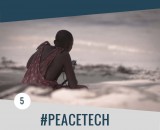Download
PDF
March 2015
Today, small tech gadgets are ubiquitous in many corners of the globe and our dependence on advanced technology is increasingly a reality. The latest issue of Building Peace, #PeaceTech, explores the potential—and limits—of Information and Communication Technologies (ICTs) and other tools to positively influence peace and development.
In our fifth publication, we look at the use of grassroots quantitative data gathering in Zimbabwe, the potential of online activism to connect local communities in Nigeria, and the story of how the “Facebook of Afghanistan” grew from a telecommunications company to an important partner to civil society and government. We also address the digital divide that has left 60% of the world’s voices unheard, as well as the applications of drones for humanitarian work in Syria and beyond.
If you are reading Building Peace, you have access to Information and Communication Technologies (ICTs): a smartphone, a tablet, a computer at your community internet café, or a friend who […]
Technology draws on many disciplines within the scientific arena, from traditional tools to modern innovations. This includes the fields of information technology, computer science, and engineering, as well as telecommunications […]
Nigeria ranks fourth in the world on the 2014 Global Terrorism Index (GTI), and first in Africa. Acts of terrorism, along with militancy, crime, rights violations, extrajudicial killings, violent demonstrations, […]
For the past fifteen years, Zimbabwe has endured a crisis that has eroded the economic and social well-being of its people. In 2013, the Zimbabwe National Statistics Agency revealed that […]
In December, I met three inspiring girls in Mumbai, India. They were all about 13 years old and they had come from Dharavi, Asia’s largest slum, to demonstrate the mobile […]
Peace technology, as we have defined it at the Stanford Peace Innovation Lab, is fundamentally mediating technology—it acts as an intervening agent, augmenting our ability to engage positively with others. […]
In downtown Beirut, since the beginning of the 20th century, Martyrs’ Square has been the site of countless political events—a public space that marked the country’s history and symbolized freedom […]
Issues that are considered global problems—climate change, the energy crisis, and poverty—are, in many regards, urban phenomena. Cities are responsible for 75 percent of global energy consumption; 80 percent of […]
The mobile technology boom in the developing world is hardly news anymore. There is no shortage of coverage on the ways mobile phones have influenced the lives of people in […]
The rapid proliferation of mobile and Internet technologies has given rise to an unprecedented flow of communication between and among citizens and their governments and the ability to obtain and […]
It is hard for the general public in the United States to connect to a crisis as catastrophic and brutal as the one devastating Syria. Four years have passed since […]
The last decade has seen significant developments in military technology and a global re-thinking of military approaches to future threats. The focus of modern initiatives is to counter threats at […]
Ushahidi was born from the efforts of a team of Kenyan programmers, journalists, and lawyers who wanted to find a way to quickly share information about the violence around them […]
Information and communication technologies (ICTs) are transforming relationships. Networks are rapidly replacing hierarchies; the power of actors to effect change increasingly depends on the number of connections they have rather […]
John Arquilla recently asked, “what if we, too, could imagine the Internet serving as a vehicle for cooperation, the sharing of hopeful stories; the communications link between moderate citizens creating […]
In 2013, a group of Ethiopian bloggers and journalists created a blog to express their interest in a more open, inclusive, and democratic country. They called the blog Zone9, an […]
As peacebuilders continue to explore new ways to manage and reduce conflict, digital games and apps present promising avenues for innovation. Digital games and apps are websites or web applications […]
Download the infographic as a pdf

